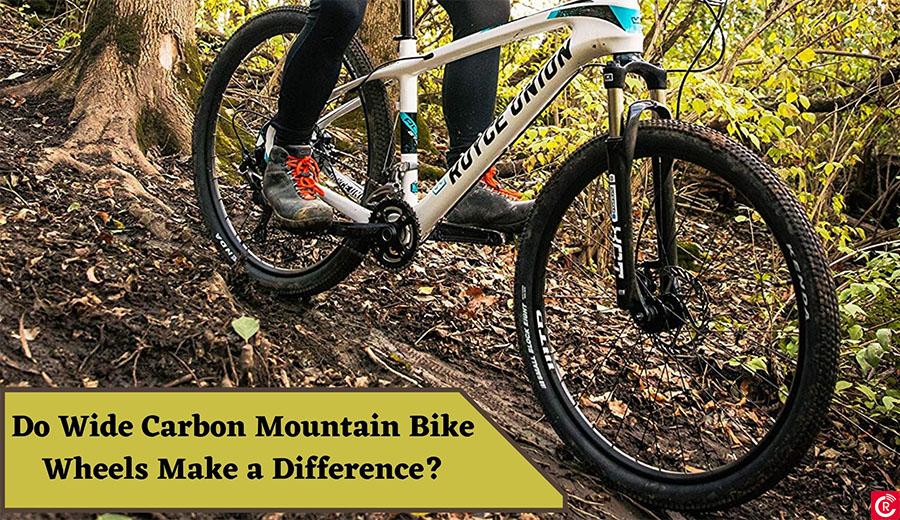
If you want to spark a conversation between your mountain biking friends, start the conversation on whether or not to choose carbon or aluminum MTB wheels. Of course, mountain bikers loyal to the aluminum MTB wheels will hesitate to switch to carbon wheels. Those who have already switched to carbon MTB wheels claim to feel lighter and find it much more durable. The conversation is polarized, asking what exactly the truth is? Which MT wheels are better, Aluminum or Carbon? The polarized conversation has some truth in it. Of course, there is a performance difference on switching from Aluminum to Carbon, but the question then arises, “What are the performance changes?” If carbon wheels are better, which size is preferable?
Carbon MTB wheels and their evolution
Mountain biking is a bit more complicated than road cycling in terms of the durability of the wheels and the physics involved. Road cycling is straightforward with smoother roads, and stiff, weighted, and aerodynamic wheels will suffice to improve its performance. However, mountain biking requires wheels that include these attributes in addition to sturdiness. Well, carbon wheels can help you provide the performance you need. However, many Reddit posts, blogs, and other biking websites say the opposite, which instills a wave of doubt among mountain bikers on choosing carbon bikes.
Carbon technology has evolved over the past ten years, and there is no doubt about its durability. Therefore, it makes perfect sense to state that modern carbon MTB wheels are pretty reliable and also aids in improving performance. Having said this, more MTB manufacturers are using modern carbon wheels. Additionally, to help establish trust about carbon wheels once again, many MTB manufacturers offer carbon wheel warranties which are pretty generous. The best mountain bikes depend on the wheel material used, suspension, durability, and cost.
Here are the attributes of wide carbon MTB wheels and how it makes a difference in your performance.
- Weight
It seemed impossible in the earlier days to have a light and strong material at the same time. However, this has been achieved and made a reality with modern technology. The carbon MTB wheels result from this, which has a higher strength to weight ratio. The ratio infers that the density is almost half of aluminum and has five times less dense than steel. Additionally, it offers higher strength. Therefore, lightweight and higher strength is the ideal wheel material for mountain biking.
- Stiffness
While aluminum wheels stiffness does not compare to carbon wheels, carbon wheels are in a whole different league. Added lightweight and stiff carbon wheels are an ideal combo that one looks for in a bike. The stiffer wheels offer control which the lightweight of the wheel offers ease of control. At first, using a carbon wheel mountain bike can feel different, but once you get a hand for it, things get much better.
- Wider carbon wheels
By now, it is clear that modern MTB carbon wheels are the winner. The question then arises which size is preferable. Evidently, wider carbon wheels are preferable as the physics support the claim. Wider mountain bike carbon wheels have a larger surface volume, making room for large air volume. The correlation is that having a good air volume offers better traction, increasing your confidence in the track with gravel and sand.
- Durability
The durability of the carbon wheels also depends on the surface area of the wheels and rims. Additionally, the larger surface area of the rims supports wider carbon wheels.
Furthermore, the correlation between durability and wider carbon wheels is simple. Since wider carbon wheels allow efficient absorption of bumps, it becomes clear that they are durable. Additionally, the wider carbon wheels are sturdier, and the better traction allows good grip.
Many mountain bikers find carbon wheels stronger and durable as compared to aluminum. With wider carbon wheels, this adds to the durability factor. Increased durability allows a longer life. Changing mountain bikes can affect performance for some. Hence durable MTB bikes are suitable for performance.
Lightweight wheels require less energy and therefore allow moving upslope efficiently with an added strength aspect that avoids damaging rims due to rock and roots. Furthermore, the weight difference between aluminum and carbon wheels is almost half a pound, making a significant difference in wheel inertia and improving performance. Hence, carbon wheels can indeed make a difference for mountain biking.
Stiffer and light-wheels with durability will allow you more sensitized control, help maintain the speed, and help keep the back livelier and enjoy the adrenaline rush of moving swiftly while riding. An added advantage of carbon wheels is that they can be engineered to be rigid in specific directions. As a result, the lateral stiffness and vertical compliance are balanced and optimized with added shock absorption properties. Additionally, wide carbon wheels contribute significantly to improving stiffness and steer controls.
Additionally, the wide surface volume allows a smooth absorption of bumps. As a result, you can ride on bumpy trails easily with wider carbon wheels. Hence, wider carbon wheels can improve your performance significantly and be the owner of full-suspension mountain bikes.
What do Riders think after using carbon bikes?
In theory, all of this makes sense when compared with mechanical concepts in physics, but what about reality? The theoretical aspect is checked off; now it’s time to check what mountain bikers think about wider carbon MTB wheels. For the record, mountain bikers feel the top 5 mountain bikes include Ibis Ripmo V2 XT, Niner AIR9 RDO, DT Swiss E 1900 Spline 30, Hunt Enduro Wide V2, and Mavic Deemax Pro Sam Hill.
Mountain bikers love carbon wheels as they are durable, lightweight, and experience no carbon wheel failures. In addition, they have maintained a good grip and the stiffness of wider carbon wheels allows them to be in control.
The clear winner between the polarize conversation is carbon wheels, where wider carbon wheels significantly impact your performance. The drawback of carbon wheels is that it is costlier. However, don’t forget that MTB manufacturers are generous with the carbon wheel warranty.





